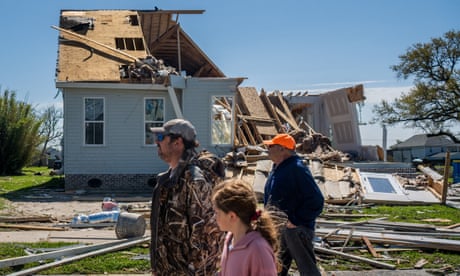- by foxnews
- 18 Mar 2025
‘One traumatic thing after another’: New Orleans homes flattened by giant twisters
‘One traumatic thing after another’: New Orleans homes flattened by giant twisters
- by theguardian
- 24 Mar 2022
- in news

For Bonnie Norris, the tornadoes that tore through New Orleans on Tuesday evening seemed to come out of nowhere. She and her boyfriend were watching television when something outside caught their attention.
Norris described the tornado as a black, spinning vortex. She said the noise was deafening, like a freight train. "I just remember saying, 'Here it comes, here it comes.'"
Jumping into action, Norris's boyfriend suggested they take shelter in a closet, but at the last second, Norris said they should lie down in the bathtub. That decision may have saved both of their lives. Moments later, their home was demolished, caving in on top of them.
"The tub is what saved us," Norris said. "It was an all-surround tub and the roof came down in one piece. It protected us, and we were able to get out."
The two or more tornadoes that tore through the New Orleans metro region Tuesday evening killed at least two people and carved a swath of destruction in a region still recovering from the effects of Hurricane Ida last year.
Norris lives on Patricia Street in Arabi, a small town in St Bernard parish, which borders New Orleans to the south-east. The twister that destroyed her home was spawned by the same system of severe thunderstorms that moved across the deep south and caused major damage in Texas, where the state's governor declared a disaster in 16 counties.
It's believed to have formed over a New Orleans suburb before moving across the Mississippi River into the Lower Ninth Ward and then into St Bernard parish, both of which were some of the most heavily affected areas during Hurricane Katrina in 2005 that killed more than 1800 people. But Arabi appears to be the hardest hit by Tuesday's tornado.
Surveying the damage on Wednesday morning, Norris reflected on the pile of rubble that was once her home. "I moved here just over four years ago, and it's been one traumatic thing after another," she said.
Six months ago, Hurricane Ida hit the region, 16 years to the day after Katrina. Norris said their home was still being repaired from damage caused by the category 4 hurricane.
"We had roof damage for Ida and we were fighting with Fema about getting the roof fixed," Norris said, fighting back tears. "Now I don't know where we're at."
Nearly every home in Norris's neighborhood was either completely destroyed or heavily damaged by the tornado. None of them are habitable.
Just a few houses down, her neighbor, Leslie Burt, lost her entire roof, and every window was blown out. She was on the phone with her uncle when the tornado hit her home.
"It happened so fast," Burt said. "I just saw through the windows it was spinning, I heard a train sound, and I grabbed by dogs and went to the bathroom."
A block over from Burt, Cheryl Danier's home suffered extensive damage, with two-by-four planks sticking out of the walls and roof. "It was loud, very loud. The house was shaking and I could hear debris just hitting, hitting, hitting everywhere."
Danier's house, built after her first home floated away in Katrina's floodwaters, is still standing. She said she built her new home to be six feet off of the ground so it wouldn't flood again. "I did that for the water," Danier said with a small, pained laugh, "but I didn't account for the wind. I didn't plan on tornadoes."
While the region is more known for dealing with hurricanes, tornadoes aren't entirely uncommon in New Orleans. But they seem to be getting more frequent - and more powerful. Tornadoes are rated using the Fujita scale and receive a rating of EF0 to EF5. The higher the number, the stronger the twister.
Since 1950, there have been 21 total tornadoes in New Orleans and at least seven have touched down with a rating of EF2 or higher. The tornado that hit Arabi on Tuesday night was rated "at least" EF3, with the National Weather Service office in New Orleans issuing a preliminary rating. The last tornado rated higher than EF2 tore through swaths of eastern New Orleans in 2017, and the most recent one touched down in May last year.
Tracking the storm on live television, meteorologist Margaret Orr pointed out the tornado just as it appeared on camera on Tuesday, and captured the sentiments of almost every New Orleanian.
"There it is - you can see it," she said. "Folks, this is something I hoped I would never see."
- by foxnews
- descember 09, 2016
Travelers can hunt for million-year-old fossils and more valuable treasures in these spots
Travelers can dig up 66-million-year-old dinosaur fossils in New Jersey or mine for diamonds at an Arizona state park. See more U.S. locations where you can hunt for treasures.
read more


